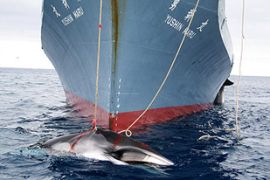Whaling body proposes compromise
Proposed plan would allow whaling nations return to limited commercial whale hunts.

Japan has described the Australian threat as “unfortunate” and rejected suggestions its current hunt is illegal.
‘Sustainable’ catch
Speaking to Al Jazeera on Tuesday Hidenobu Sobashima, a Japanese foreign ministry spokesman, said that Japan wants to resolve the dispute through diplomatic channels first.
 |
| Japan has vowed to defend what it says is its right to continue whaling [Reuters] |
“We regret that the Australian side has indicated the possibility of bringing the whaling issue to an international court, but both sides have agreed that we will first make an effort to reach a diplomatic solution,” he said.
Reports say the IWC group’s proposal follows nearly 18 months of closed-door talks aimed at ending a deadlock between pro- and anti-whaling nations.
Cristian Maquieira, the chairman of the IWC’s support group, was quoted as saying that any final deal would “reduce catches significantly from current levels” and “establish caps of takes that are within sustainable levels for a 10-year period”.
The current quota for hunting under a scientific whaling programme is set at 990 whales each year.
Only three nations – Japan, Norway and Iceland – hunt whales, all of whom argue that whaling is an important part of their culture.
Under the proposal the three countries would also receive quotas set within sustainable levels for each hunted species.
‘Disaster’
The plan however has received a critical response from conservation groups, with Greenpeace describing the proposal as a “disaster” which it said would only make it more difficult to protect other rapidly declining species such as tuna and sharks.
|
“It is difficult to see how determining quotas through politics rather than science can be considered progress“ Rob Nicoll, WWF-Australia Antarctic and Southern Ocean Initiative manager |
“The proposal rewards Japan for decades of reprehensible behaviour at the IWC and in the Southern Ocean Whale Sanctuary,” John Frizell, the head of Greenpeace’s whales campaign, was quoted as saying in The Australian newspaper.
The World Wildlife Fund (WWF) said the proposed whaling compromise set a dangerous precedent and could legitimise “scientific” whaling by Japan.
“What we need is to eliminate all whaling in the Southern Ocean, including Japanese commercial whaling thinly disguised as ‘scientific research’,” said Rob Nicoll, the manager of WWF-Australia’s Antarctic and Southern Ocean Initiative.
“But what we have now is a deal which could make it even easier for Japan to continue taking whales in this ecologically unique place,” he added.
“It is difficult to see how determining quotas through politics rather than science can be considered progress.”